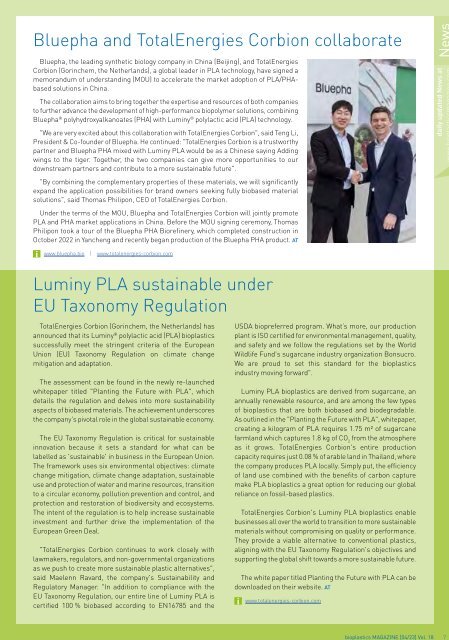Issue 04/2023
Highlights 100th issue Rebranding
Highlights
100th issue
Rebranding
You also want an ePaper? Increase the reach of your titles
YUMPU automatically turns print PDFs into web optimized ePapers that Google loves.
ioplastics MAGAZINE [<strong>04</strong>/23] Vol. 18<br />
7<br />
Bluepha and TotalEnergies Corbion collaborate<br />
Bluepha, the leading synthetic biology company in China (Beijing), and TotalEnergies<br />
Corbion (Gorinchem, the Netherlands), a global leader in PLA technology, have signed a<br />
memorandum of understanding (MOU) to accelerate the market adoption of PLA/PHAbased<br />
solutions in China.<br />
The collaboration aims to bring together the expertise and resources of both companies<br />
to further advance the development of high-performance biopolymer solutions, combining<br />
Bluepha ® polyhydroxyalkanoates (PHA) with Luminy ® polylactic acid (PLA) technology.<br />
"We are very excited about this collaboration with TotalEnergies Corbion", said Teng Li,<br />
President & Co-founder of Bluepha. He continued: "TotalEnergies Corbion is a trustworthy<br />
partner and Bluepha PHA mixed with Luminy PLA would be as a Chinese saying Adding<br />
wings to the tiger. Together, the two companies can give more opportunities to our<br />
downstream partners and contribute to a more sustainable future".<br />
"By combining the complementary properties of these materials, we will significantly<br />
expand the application possibilities for brand owners seeking fully biobased material<br />
solutions", said Thomas Philipon, CEO of TotalEnergies Corbion.<br />
Under the terms of the MOU, Bluepha and TotalEnergies Corbion will jointly promote<br />
PLA and PHA market applications in China. Before the MOU signing ceremony, Thomas<br />
Philipon took a tour of the Bluepha PHA Biorefinery, which completed construction in<br />
October 2022 in Yancheng and recently began production of the Bluepha PHA product. AT<br />
daily updated News at<br />
www.bluepha.bio | www.totalenergies-corbion.com<br />
Luminy PLA sustainable under<br />
EU Taxonomy Regulation<br />
TotalEnergies Corbion (Gorinchem, the Netherlands) has<br />
announced that its Luminy ® polylactic acid (PLA) bioplastics<br />
successfully meet the stringent criteria of the European<br />
Union (EU) Taxonomy Regulation on climate change<br />
mitigation and adaptation.<br />
The assessment can be found in the newly re-launched<br />
whitepaper titled "Planting the Future with PLA", which<br />
details the regulation and delves into more sustainability<br />
aspects of biobased materials. The achievement underscores<br />
the company's pivotal role in the global sustainable economy.<br />
The EU Taxonomy Regulation is critical for sustainable<br />
innovation because it sets a standard for what can be<br />
labelled as 'sustainable' in business in the European Union.<br />
The framework uses six environmental objectives: climate<br />
change mitigation, climate change adaptation, sustainable<br />
use and protection of water and marine resources, transition<br />
to a circular economy, pollution prevention and control, and<br />
protection and restoration of biodiversity and ecosystems.<br />
The intent of the regulation is to help increase sustainable<br />
investment and further drive the implementation of the<br />
European Green Deal.<br />
"TotalEnergies Corbion continues to work closely with<br />
lawmakers, regulators, and non-governmental organizations<br />
as we push to create more sustainable plastic alternatives",<br />
said Maelenn Ravard, the company's Sustainability and<br />
Regulatory Manager. "In addition to compliance with the<br />
EU Taxonomy Regulation, our entire line of Luminy PLA is<br />
certified 100 % biobased according to EN16785 and the<br />
USDA biopreferred program. What’s more, our production<br />
plant is ISO certified for environmental management, quality,<br />
and safety and we follow the regulations set by the World<br />
Wildlife Fund's sugarcane industry organization Bonsucro.<br />
We are proud to set this standard for the bioplastics<br />
industry moving forward".<br />
Luminy PLA bioplastics are derived from sugarcane, an<br />
annually renewable resource, and are among the few types<br />
of bioplastics that are both biobased and biodegradable.<br />
As outlined in the "Planting the Future with PLA", whitepaper,<br />
creating a kilogram of PLA requires 1.75 m² of sugarcane<br />
farmland which captures 1.8 kg of CO 2<br />
from the atmosphere<br />
as it grows. TotalEnergies Corbion's entire production<br />
capacity requires just 0.08 % of arable land in Thailand, where<br />
the company produces PLA locally. Simply put, the efficiency<br />
of land use combined with the benefits of carbon capture<br />
make PLA bioplastics a great option for reducing our global<br />
reliance on fossil-based plastics.<br />
TotalEnergies Corbion's Luminy PLA bioplastics enable<br />
businesses all over the world to transition to more sustainable<br />
materials without compromising on quality or performance.<br />
They provide a viable alternative to conventional plastics,<br />
aligning with the EU Taxonomy Regulation's objectives and<br />
supporting the global shift towards a more sustainable future.<br />
The white paper titled Planting the Future with PLA can be<br />
downloaded on their website. AT<br />
www.totalenergies-corbion.com

















